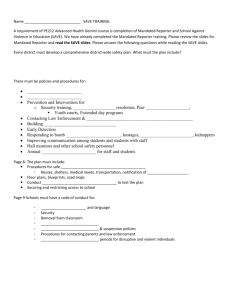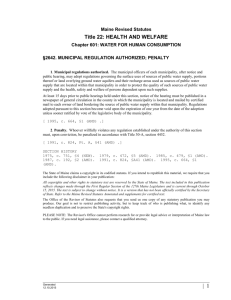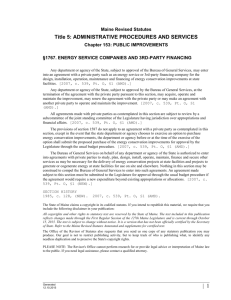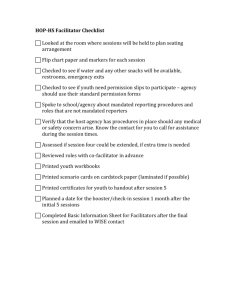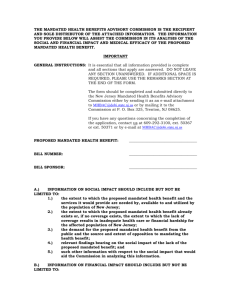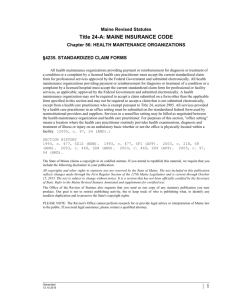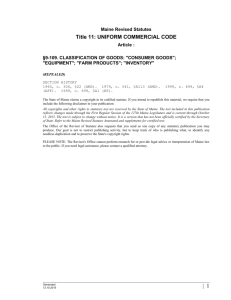2752 MS-Word - Maine Legislature
advertisement
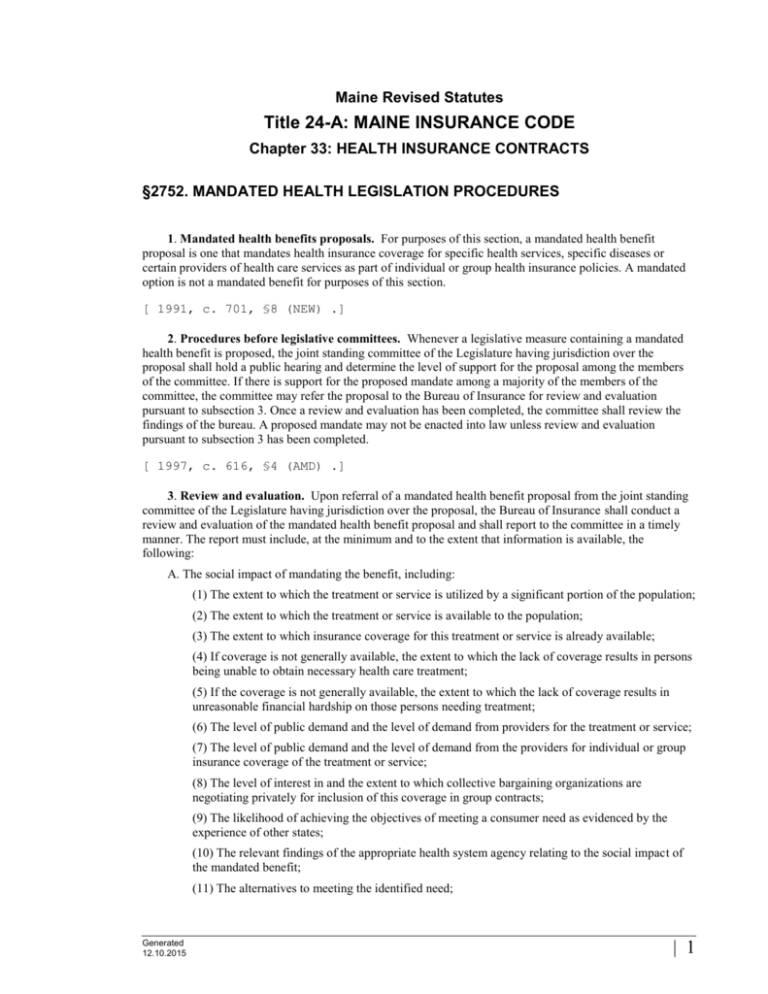
Maine Revised Statutes Title 24-A: MAINE INSURANCE CODE Chapter 33: HEALTH INSURANCE CONTRACTS §2752. MANDATED HEALTH LEGISLATION PROCEDURES 1. Mandated health benefits proposals. For purposes of this section, a mandated health benefit proposal is one that mandates health insurance coverage for specific health services, specific diseases or certain providers of health care services as part of individual or group health insurance policies. A mandated option is not a mandated benefit for purposes of this section. [ 1991, c. 701, §8 (NEW) .] 2. Procedures before legislative committees. Whenever a legislative measure containing a mandated health benefit is proposed, the joint standing committee of the Legislature having jurisdiction over the proposal shall hold a public hearing and determine the level of support for the proposal among the members of the committee. If there is support for the proposed mandate among a majority of the members of the committee, the committee may refer the proposal to the Bureau of Insurance for review and evaluation pursuant to subsection 3. Once a review and evaluation has been completed, the committee shall review the findings of the bureau. A proposed mandate may not be enacted into law unless review and evaluation pursuant to subsection 3 has been completed. [ 1997, c. 616, §4 (AMD) .] 3. Review and evaluation. Upon referral of a mandated health benefit proposal from the joint standing committee of the Legislature having jurisdiction over the proposal, the Bureau of Insurance shall conduct a review and evaluation of the mandated health benefit proposal and shall report to the committee in a timely manner. The report must include, at the minimum and to the extent that information is available, the following: A. The social impact of mandating the benefit, including: (1) The extent to which the treatment or service is utilized by a significant portion of the population; (2) The extent to which the treatment or service is available to the population; (3) The extent to which insurance coverage for this treatment or service is already available; (4) If coverage is not generally available, the extent to which the lack of coverage results in persons being unable to obtain necessary health care treatment; (5) If the coverage is not generally available, the extent to which the lack of coverage results in unreasonable financial hardship on those persons needing treatment; (6) The level of public demand and the level of demand from providers for the treatment or service; (7) The level of public demand and the level of demand from the providers for individual or group insurance coverage of the treatment or service; (8) The level of interest in and the extent to which collective bargaining organizations are negotiating privately for inclusion of this coverage in group contracts; (9) The likelihood of achieving the objectives of meeting a consumer need as evidenced by the experience of other states; (10) The relevant findings of the appropriate health system agency relating to the social impact of the mandated benefit; (11) The alternatives to meeting the identified need; Generated 12.10.2015 | 1 MRS Title 24-A §2752. MANDATED HEALTH LEGISLATION PROCEDURES (12) Whether the benefit is a medical or a broader social need and whether it is consistent with the role of health insurance and the concept of managed care; (13) The impact of any social stigma attached to the benefit upon the market; (14) The impact of this benefit on the availability of other benefits currently being offered; (15) The impact of the benefit as it relates to employers shifting to self-insured plans and the extent to which the benefit is currently being offered by employers with self-insured plans; and (16) The impact of making the benefit applicable to the state employee health insurance program; [2011, c. 90, Pt. J, §21 (AMD).] B. The financial impact of mandating the benefit, including: (1) The extent to which the proposed insurance coverage would increase or decrease the cost of the treatment or service over the next 5 years; (2) The extent to which the proposed coverage might increase the appropriate or inappropriate use of the treatment or service over the next 5 years; (3) The extent to which the mandated treatment or service might serve as an alternative for more expensive or less expensive treatment or service; (4) The methods that will be instituted to manage the utilization and costs of the proposed mandate; (5) The extent to which the insurance coverage may affect the number and types of providers of the mandated treatment or service over the next 5 years; (6) The extent to which insurance coverage of the health care service or provider may be reasonably expected to increase or decrease the insurance premium and administrative expenses of policyholders; (7) The impact of indirect costs, which are costs other than premiums and administrative costs, on the question of the costs and benefits of coverage; (8) The impact of this coverage on the total cost of health care, including potential benefits and savings to insurers and employers because the proposed mandated treatment or service prevents disease or illness or leads to the early detection and treatment of disease or illness that is less costly than treatment or service for later stages of a disease or illness; (9) The effects of mandating the benefit on the cost of health care, particularly the premium and administrative expenses and indirect costs, to employers and employees, including the financial impact on small employers, medium-sized employers and large employers; and (10) The effect of the proposed mandate on cost-shifting between private and public payors of health care coverage and on the overall cost of the health care delivery system in this State. In order to enable the committee to assess the financial impact of the benefit, the report must include a comparison of the rate of increase in the Consumer Price Index for medical care services to the rate of increase in the Consumer Price Index for the previous year and the current year as reported by the United States Department of Labor, Bureau of Labor Statistics; [2005, c. 125, §1 (AMD).] C. The medical efficacy of mandating the benefit, including: (1) The contribution of the benefit to the quality of patient care and the health status of the population, including the results of any research demonstrating the medical efficacy of the treatment or service compared to alternatives or not providing the treatment or service; and (2) If the legislation seeks to mandate coverage of an additional class of practitioners: (a) The results of any professionally acceptable research demonstrating the medical results achieved by the additional class of practitioners relative to those already covered; and (b) The methods of the appropriate professional organization that assure clinical proficiency; and [1991, c. 701, §8 (NEW).] D. The effects of balancing the social, economic and medical efficacy considerations, including: | 2 Generated 12.10.2015 MRS Title 24-A §2752. MANDATED HEALTH LEGISLATION PROCEDURES (1) The extent to which the need for coverage outweighs the costs of mandating the benefit for all policyholders; (2) The extent to which the problem of coverage may be solved by mandating the availability of the coverage as an option for policyholders; and (3) The cumulative impact of mandating this benefit in combination with existing mandates on the costs and availability of coverage. [1997, c. 616, §5 (AMD).] [ 2011, c. 90, Pt. J, §21 (AMD) .] SECTION HISTORY 1991, c. 701, §8 (NEW). 1997, c. 616, §§4,5 (AMD). 2001, c. 258, §I1 (AMD). 2005, c. 125, §1 (AMD). 2011, c. 90, Pt. J, §21 (AMD). The State of Maine claims a copyright in its codified statutes. If you intend to republish this material, we require that you include the following disclaimer in your publication: All copyrights and other rights to statutory text are reserved by the State of Maine. The text included in this publication reflects changes made through the First Regular Session of the 127th Maine Legislature and is current through October 15, 2015. The text is subject to change without notice. It is a version that has not been officially certified by the Secretary of State. Refer to the Maine Revised Statutes Annotated and supplements for certified text. The Office of the Revisor of Statutes also requests that you send us one copy of any statutory publication you may produce. Our goal is not to restrict publishing activity, but to keep track of who is publishing what, to identify any needless duplication and to preserve the State's copyright rights. PLEASE NOTE: The Revisor's Office cannot perform research for or provide legal advice or interpretation of Maine law to the public. If you need legal assistance, please contact a qualified attorney. Generated 12.10.2015 | 3
